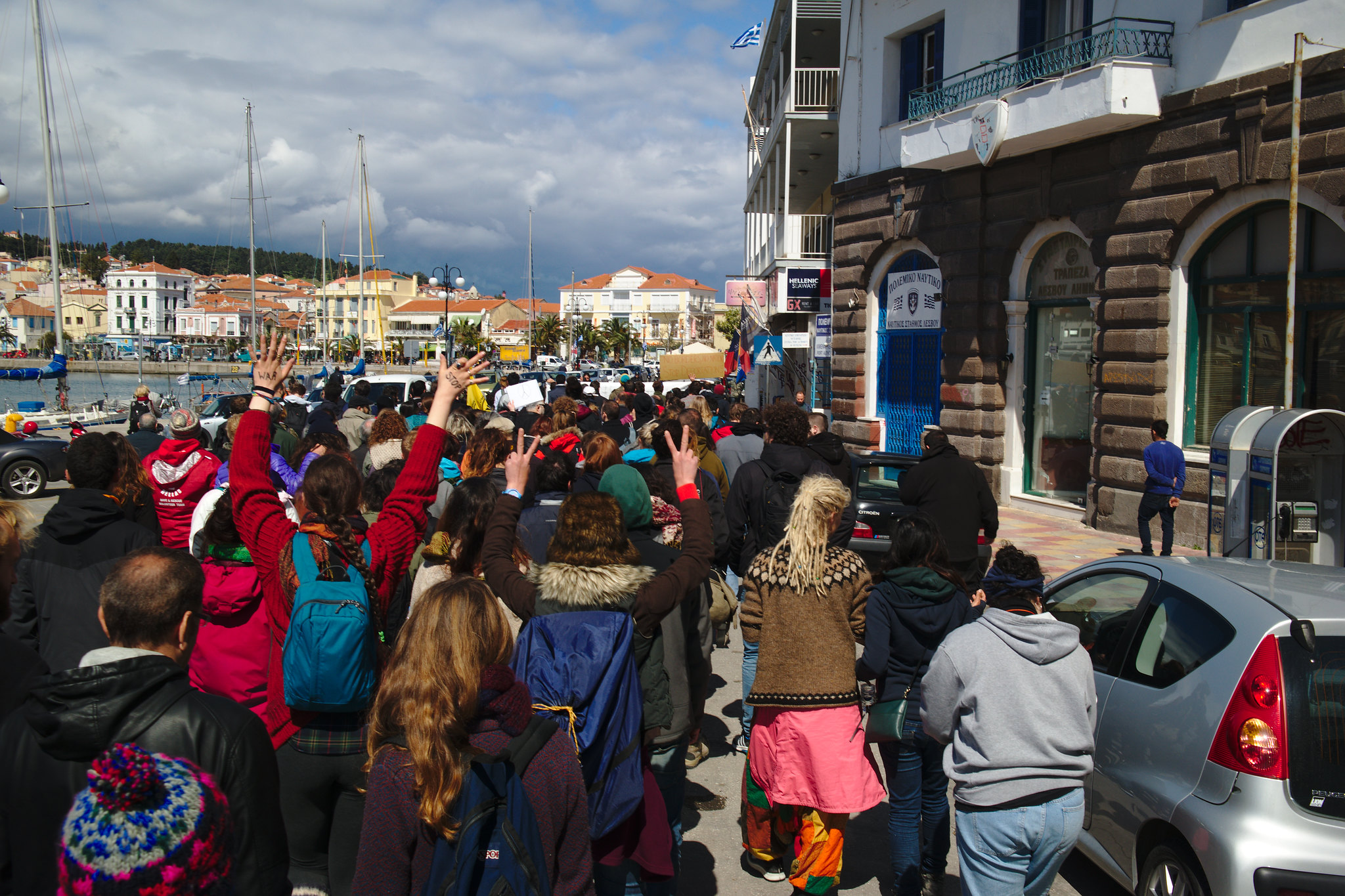On 6 January 2022, I had a feeling of déjà vu. First in Chios, and later that day in Lesvos, we watched as huge crowds gathered at the ports to resist the disembarkation of heavy machinery. This equipment would facilitate the construction of new ‘camps’ on the islands. These ‘camps’ – Akra Pachy in Chios and Vastria in Lesvos – are in remote locations, far from the cities and with little infrastructure connecting them to wider society. They will be one step closer to prison camps.
Maybe this sounds familiar. In February 2020 in Lesvos, CPT Aegean Migrant Solidarity observed mass protests against the proposed construction of new camps. A large deployment of MAT units (riot police) arrived in Mytilene port with the intention of securing land designated as the site of a new closed ‘camp.’ The resistance to these plans came from across the political spectrum, of course with several different motivations. That night at the Mytilene port, there was deep tension between this uneasy alliance. We stood with our friends, people who were involved with self-organized migrant solidarity groups. We stood alongside those with whom we have our disagreements but who share the position that there should be no ‘camps’ because camps are prisons. But we also stood amongst our opposition, those who do not want camps because they can’t stand the people in them. These same people standing beside us had been attacking migrants in the streets for several weeks, and attacking us too, Greeks and internationals suspected of supporting migrants.
We watched as the ship carrying the MAT units arrived from Athens like an occupier. On one side of the port the garbage collectors had parked their trucks locking the police in; on the other side a group of combative men had ripped down the port’s fence. It was confusing. The police disembarked in formation and as they marched from the port they fired tear gas. For an hour or two, we were on a cat and mouse chase through the streets of Mytilene, dodging gas and ducking down alleyways. The far-right bloc remained close to the port where they beat up a foreign journalist caught in the wrong place at the wrong time. We spent the end of the night locked in a bar, a little dumbstruck, consoling ourselves with a beer.
For the next two days, pitched battles took place on a stretch of road leading up to the location of the new camp. After the chaos of the night before, many of us internationals in Lesvos weren’t sure whether we should go. Some of us thought that we were too visible as foreigners, and therefore de-facto as NGO workers, whom the far-Right partly blamed for the Moria years. On top of this, we were uncomfortable with the fragile new alliances and unable to speak enough Greek to understand who we were standing next to. In the end, we felt there was nothing to be done but to go regardless. When we arrived we saw men in the hills draped in Greek flags fighting among the rocks with small groups of police. Then more tear gas and banging forced us to retreat back through the carnival. Orthodox priests were riding in the back of pickup trucks giving encouragement to the men who continued to emerge and vanish through the bushes to fight in the hills.
On the second day of the battle, the police retreated from that stretch of road, smashing the windows of as many cars as possible on the way out. They returned to the military barracks in Pagani where they had been staying. That night the islanders laid siege to the barracks, throwing Molotov cocktails at its gates. In the morning, the police returned to Athens. The island had driven the occupiers out. But whose victory was it? And who was next in the firing line?
Embed from Getty ImagesOn the morning of the retreat, people gathered with their flags in Mytilene’s main square, Plateia Sapphous, for a huge victory march. A friend asked me what I thought of the scene. I said I felt uneasy not knowing who I was standing next to, when many of the crowd had different ends in mind. He replied that I was too nervous, that we had reached a turning point: ‘Right and Left together against the state.’ I wasn’t convinced. The march passed calmly but as we walked home, footage came through WhatsApp showing a gang of far-right vigilantes had attacked a car driven by NGO volunteers. This was the start of at least two weeks of serious, coordinated far-right violence, harassment and intimidation of migrants, NGO workers, and people suspected of supporting them. After feeling that they had driven out the police, the far-Right used the momentum to try to drive out their other targets.
Now, as preparations are underway for the construction of the new ‘camp’ in Vastria, the same forces are mobilizing. On 6 January 2022, as the crowds gathered to block the arrival of construction machinery, the far-Right made its position clear. The ‘Free Citizens of Mytilene,’ a far-right nationalist and Islamophobic bloc of local government stated online: “So there are no misunderstandings: We are with the residents who react because they don’t want illegal immigrants and illegal structures. We are not with those who react because they consider the ‘structures’ prisons.”
Again we are united in our aim but not by motivation. Over the following days I talked with a few friends in Lesvos about the last time, and about my suspicion that, although we had little choice but to join the mobilization against the new camp, we had only helped to dig our own grave. Was our presence (as a relatively small group of people who were members of self-organized migrant solidarity groups) effective at all beyond just stating our position? And would we do it again?




